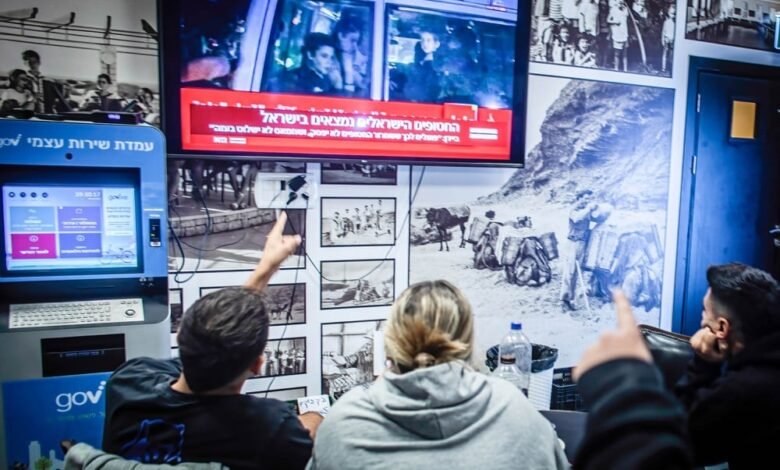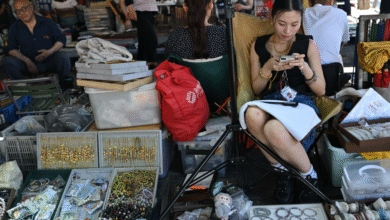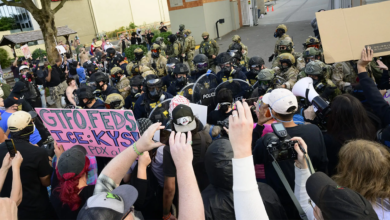How the Hamas Attacks on Oct. 7 Changed the Israeli Media

On July 17, an unusual demonstration took place outside the studios of Channel 12, Israel’s most popular news outlet: a small group of Israeli peace activists gathered carrying pictures of Palestinian children killed during Israel’s ongoing war in Gaza and a banner in Hebrew and Arabic asking: “What’s the media hiding?” This was unusual, because although several thousand Israelis were demonstrating weekly to demand an end to the two-year-old war, expressions of concern about Palestinian civilian suffering and deaths remained rare.
Inside the studios, the protest led to another unusual event — a brief but intense exchange between reporters and Avi Weiss, the station’s CEO, about how the Israeli media should cover Israel’s longest and bloodiest war, which has led to accusations of war crimes, crimes against humanity — and even genocide. Two reporters expressed their support for the protesters in a group chat that was later leaked to the media. They wondered: Is it not the responsibility of the Israeli media to report the news, whatever it is? Other reporters responded, saying that Israeli viewers should be spared images and descriptions of Palestinian suffering while the war continues, Israeli hostages remain imprisoned by Hamas, and Israeli soldiers continue to fight and die. Weiss abruptly ended the conversation, advising his reporters not to side with their critics, according to media reports.
On July 17, an unusual demonstration took place outside the studios of Channel 12, Israel’s most popular news outlet: a small group of Israeli peace activists gathered carrying pictures of Palestinian children killed during Israel’s ongoing war in Gaza and a banner in Hebrew and Arabic asking: “What’s the media hiding?” This was unusual, because although several thousand Israelis were demonstrating weekly to demand an end to the two-year-old war, expressions of concern about Palestinian civilian suffering and deaths remained rare.
Inside the studios, the protest led to another unusual event — a brief but intense exchange between reporters and Avi Weiss, the station’s CEO, about how the Israeli media should cover Israel’s longest and bloodiest war, which has led to accusations of war crimes, crimes against humanity — and even genocide. Two reporters expressed their support for the protesters in a group chat that was later leaked to the media. They wondered: Is it not the responsibility of the Israeli media to report the news, whatever it is? Other reporters responded, saying that Israeli viewers should be spared images and descriptions of Palestinian suffering while the war continues, Israeli hostages remain imprisoned by Hamas, and Israeli soldiers continue to fight and die. Weiss abruptly ended the conversation, advising his reporters not to side with their critics, according to media reports.
The protest and the debate it sparked within Channel 12 highlighted how Hamas’s invasion of Israel on October 7, 2023 dramatically changed the media landscape in Israel. Even as the world is flooded with horrific images of mass misery and death in Gaza, Israeli public opinion remains mostly shielded by a media that was once known for its independence and willingness to criticize the government, and even the occupation of the West Bank and Gaza Strip. The shock of October 7, when the Israeli military and intelligence services failed to deter Hamas’s deadly attack on civilians living near the southern border, which killed some 1,200 Israelis and kidnapped 251 others, including women and children, to Gaza, had a profound impact on Israeli society and the media.
Even as international criticism, condemnation, and retaliatory efforts against Israel mount, Israeli television rarely reports on the consequences of Israeli actions on Palestinian civilians. Television viewers in Europe, North America, and Australia are more exposed to the horrors of Gaza than are Israelis who live an hour’s drive from Gaza City. On occasions when Israeli news channels show images from Gaza, studio commentators are often skeptical or dismissive of claims that civilians are starving or that atrocities are being committed.
Reports of a humanitarian catastrophe and widespread famine are routinely undermined by Hamas propaganda or evidence of anti-Semitism in the international community.
Ehud Yaari, Channel 12’s veteran Arab affairs analyst, was frank in his assessment of the motivations driving media coverage of the war. “If you broadcast too much about what is happening in the Gaza Strip, the West Bank, etc., we will lose viewers,” he recently said in an interview. Yari said the Israelis had “lost interest” in the impact of the war on civilians in Gaza.
Other Israeli reporters insist that their coverage is fair. Ohad Hemo, Palestinian affairs correspondent for Channel 12, said: “I think we have exposed this. We are talking about it. Hardly a day goes by without there being an item on this issue.”
A June 2025 poll showed that 64% of Israelis were satisfied with coverage of the war, and 64% agreed with the statement that “there are no innocents in Gaza,” a phrase routinely used by pundits, politicians and others to justify the staggering number of dead, wounded and displaced in Gaza, including tens of thousands of women and children.
However, “it’s not just about ratings,” said Oren Persico, a senior Israeli media analyst with Seventh Eye, the country’s leading media watchdog. He said that the media approach reflects deep trends in Israeli society that have grown over the past two decades. He said: “You have to realize that Israeli society, and with it the media, has turned to the right.” While Israel’s left-leaning elite has witnessed a steady erosion in its power and viewpoint, media coverage has changed to reflect the increasingly hard-line views of Israeli society.
However, Prime Minister Benjamin Netanyahu and his hardline government continue to target the media as disloyal, left-wing, and untrustworthy. Veteran Israeli journalist Anat Saragusti said that they are passing anti-media legislation, imposing administrative measures, and using outright intimidation. Saragusti, who previously covered Gaza for Channel 12, now heads the press freedom section of the Israel Federation of Journalists. “It is an intense and ongoing campaign taking place mainly on social media, and often led and coordinated by Netanyahu,” she said. She said this incitement inspires actual violence against journalists. “We see many of these incidents, and journalists are being intimidated.”
Israeli media also must contend with ongoing military censorship. During the war, a representative of the Military Censorship Office is often present in Israeli television studios. Any material related to war must be reviewed and approved by censors before it can be broadcast. Violations, which are almost non-existent, may result in penalties.
Before the war, it was common for Israeli journalists to make contacts and write stories about life in Gaza and the West Bank and the plight of Palestinians. From the beginning of the war, Shift focused on reporting on the war effort. Journalists collect information from Palestinian sources about the results of Israeli military operations. “If a Hamas leader was killed, I would spend my day doing a profile on the man,” said Nurit Yohanan, who was until recently the Palestinian affairs correspondent for Channel 11, the state-owned public television channel. “If there was a hostage-release agreement on the horizon, I would be asked to cover Hamas’ position.” “In general, coverage of Palestinians in the Israeli media – before October 7 and much more since – has been done through a security prism,” she said. “We view them primarily as a terrorist threat, not as human beings in distress.”
However, Yohanan said, you cannot expect Israeli journalists to cover Palestinian affairs objectively, in a country where almost everyone serves in the military or has a close relative serving in Gaza, and where more than 900 soldiers have been killed since October 7. “We are not the United Nations, and neither are we CNN or ABC. We are one side in this (conflict),” said Yohanan, who now works for the organisation, meaning taking sides. The Times of Israelan English language news site.
Yohanan said she never felt pressure at Channel 11 from her editors or colleagues to downplay her reporting on the crisis in Gaza, nor did she practice self-censorship. But its ability to cover Gaza during the war was hampered by the difficulty of finding reliable sources and the need for Israeli journalists to take into account the “general atmosphere” when covering Palestinian events. “It is simply impossible to express understanding or sympathy, or even to shine a light on the Palestinians, because of the enormous evil that occurred on October 7,” Yohanan said.
Nir Hasson, correspondent for the Israeli newspaper HaaretzHe disagreed with Yohanan’s defense of the Israeli media. “With all due respect, these are excuses,” he said. Hassoun began covering the humanitarian situation in Gaza during the war. He added: “Finding reliable sources is not difficult.” “There are ways to report…there are sources.” It relies on Palestinian correspondents in Gaza, local doctors, and international volunteers providing aid, among others. “Every day, you can find hundreds of new videos on social media, and I saw no evidence that any of them were fake,” Hassoun said. Haaretz It was the only Israeli media outlet to consistently report on the devastation in Gaza, sparking harsh criticism.
Hassoun said that the Israeli media views itself as “part of the war effort, part of an existential struggle, which means that we do not have the mental and emotional space” to cover Palestinians in Gaza. He said that Israeli journalists assume that the public does not want to know. “So what do we do? We move forward and abandon our journalistic principles.”
“I think what is ridiculous is that the Israeli public is more mature than the media and wants to know more than the media tells them.”
But Seventh Eye’s Persico isn’t so sure. Social media is the primary source of information for the Israeli public, and it serves to reinforce the message Israelis receive from the mainstream media: that Israel’s war is just, that it is an existential battle, that global criticism is fueled by hatred of Israel and anti-Semitism, and that Hamas is winning the public relations war against Israel. “Most Israelis receive their news through online applications such as Telegram, TikTok, WhatsApp or X,” Persico explained. Even if the initial source of a story on social media is a TV report, by the time it reaches the average Israeli citizen, it is filtered by algorithms and often posted by an influencer. “The result is that your consciousness is shaped not only by news organizations that betray, mislead, and repeatedly fail, but also by algorithms that seek profit rather than truth and serve your most primitive instincts,” he said. He said the reluctance of the mainstream media to report on life in Gaza, coupled with the role played by social media, provides a comfort zone of forgetfulness and denial for the Israeli public.
Saragusti, of the Israel Journalists’ Union, sees some signs of change in mainstream media reporting on the war. She said TV news is now broadcasting more stories about the suffering in Gaza as the army bombs Gaza City and hundreds of thousands of Palestinians are once again forced to flee to the south. “It’s been two years, and we still haven’t reached the point where the Israeli media is telling the whole story,” she said. “But maybe we’re seeing the beginning of a change. Maybe. It’s time.”
Don’t miss more hot News like this! Click here to discover the latest in Politics news!
2025-10-08 14:19:00




